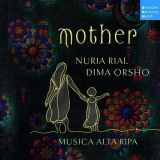 Mother; Händel: Arien aus Il Pianto di Maria HWV 234, Solomon HWV 67, Belshazzar HWV 61 + Musette aus Il Pastor fido HWV 8a + Ouvertüre Israel in Egypt HWV 54 + Tamburino aus Alcina HWV 34; Telemann: Komm o Schlaf und lass mein Leid aus Germanico; Anonymus: Wa Habibi; Dima Orsho: Hidwa + Ishtar (The Great Mother); Nuria Rial, Dima Orsho, Musica Alta Ripa; 1 CD Deutsche Harmonia Mundi 19075936412; Aufnahme 09/2017, Veröffentlichung 05/2019 (59'18) – Rezension von Remy Franck
Mother; Händel: Arien aus Il Pianto di Maria HWV 234, Solomon HWV 67, Belshazzar HWV 61 + Musette aus Il Pastor fido HWV 8a + Ouvertüre Israel in Egypt HWV 54 + Tamburino aus Alcina HWV 34; Telemann: Komm o Schlaf und lass mein Leid aus Germanico; Anonymus: Wa Habibi; Dima Orsho: Hidwa + Ishtar (The Great Mother); Nuria Rial, Dima Orsho, Musica Alta Ripa; 1 CD Deutsche Harmonia Mundi 19075936412; Aufnahme 09/2017, Veröffentlichung 05/2019 (59'18) – Rezension von Remy Franck
« Bei aller kulturellen Unterschiedlichkeit zwischen Okzident und Orient gibt es dennoch oftmals ein gemeinsames Mutter-Bild ». Von diesem Statement aus haben die spanische Sopranistin Nuria Rial, die Flötistin und Produzentin Danya Segal, die syrische Sängerin und Komponistin Dima Orsho und das Ensemble Musica Alta Ripa das Konzept dieser CD entwickelt, wobei Rial den Okzident und Orsho den Orient vertritt.
In dem zusammengestellten Programm, in dem die meisten Stücke von Georg Friedrich Händel stammen, steht der Mutterschmerz eindeutig an erster Stelle, nicht nur bei Händel, sondern auch im syrisch-christlichen Karfreitagslied Wa Habibi. In Hidwa von Dima Orsho (*1975) beklagt eine Mutter die Liebsten, die sie verloren hat. In Ishtar begegnen wir der Mutter der arabischen Welt, einer babylonischen und hethitischen Göttin, Göttin aller Göttinnen genannt. Das Stück wurde von der in den USA lebenden Dima Orsho eigens für diese Produktion komponiert und vereinigt westliche und östliche Instrumente und Stimmkulturen zu einem ganz speziellen neuen Klangdialog.
Sowohl Nuria Rial als auch Dima Orsho haben warme, wohlklingende Stimmen, die nuancenreich von sehr sensiblen Seelen geführt werden und in manchen Stücken eine so ergreifende Ausstrahlung erzielen, dass sich eine sehr entrückte Stimmung ergibt. Gerade bei Orsho verrät der Grad an Sinnlichkeit eine Kunst, die in der Sublimierung des Schmerzes oder unerfüllter Sehnsüchte von großer Wirkung ist.
Die Begleitung durch Musica Alta Ripa ist hervorragend und rundet unseren sehr guten Eindruck von dieser Produktion ab.
Wenn Sie starke und tiefe musikalische Emotionen lieben, wenn Ihnen das Besondere gefällt, dann tauchen Sie ein in diese CD, lassen Sie sich von der starken Ausdruckskraft dieser Musik bezaubern.
« Despite the cultural differences between Occident and Orient, there is a common image of the mother ». From this statement Spanish soprano Nuria Rial, flutist and producer Danya Segal, Syrian singer and composer Dima Orsho and the ensemble Musica Alta Ripa have developed the concept of this CD, whereby Rial is representing the Occident and Orsho the Orient.In the program, in which most of the pieces are by Georg Friedrich Handel, maternal pain is clearly in the first place, not only in Handel’s work but also in the Syrian-Christian Good Friday song Wa Habibi. In Hidwa by Dima Orsho (*1975), a mother laments the loved ones she has lost. In Ishtar we meet the mother of the Arab world, a Babylonian and Hittite goddess, called goddess of all goddesses. The piece was composed by Dima Orsho especially for this production and unites western and eastern instruments as well as vocal cultures to a very special new sound dialogue. Both Nuria Rial and Dima Orsho have warm, melodious voices, rich in nuances and led by very sensitive souls, which in some pieces achieve a really touching expression. The accompaniment by Musica Alta Ripa is excellent and completes our very good impression of this production. If you love strong and deep musical emotions, if you like something special, then dive into this CD, let yourself be enchanted by the strong expressiveness of this music.
























